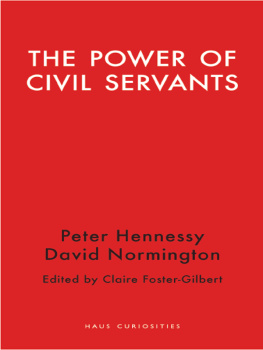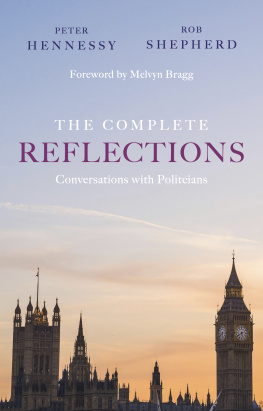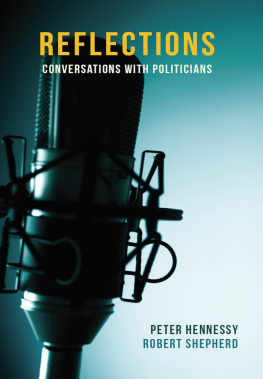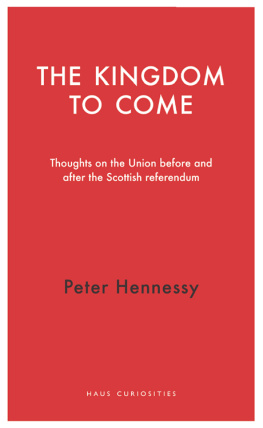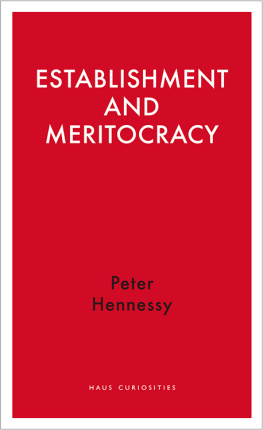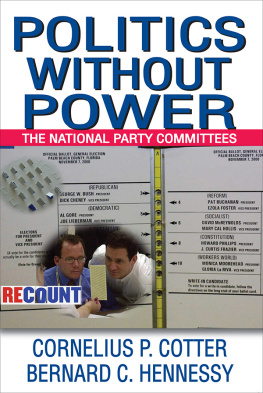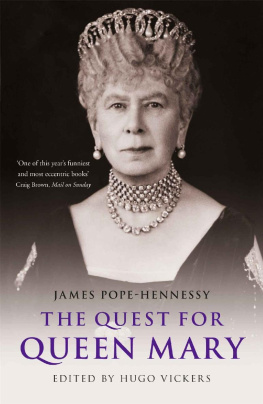HAUS CURIOSITIES
The Power of Civil Servants
About the Contributors
Claire Foster-Gilbert is the founder director of the Westminster Abbey Institute. A current and former member of numerous ethics committees, Dr Foster-Gilbert has played an instrumental role in the medical research ethics field, and has led efforts to shift the Churchs thinking on environmental issues.
Peter Hennessy is an independent cross-bench peer and Atlee Professor of Contemporary British History at Queen Mary University of London. Formerly a prominent journalist, Lord Hennessy co-founded the Institute of Contemporary British History in 1986 and entered academia in 1992.
David Normington was a civil servant for 37 years, and served as Permanent Secretary of the Department for Education and Skills (200105) and the Home Office (200611). After retiring from the Civil Service in 2011, Sir David became the First Civil Service Commissioner and Commissioner for Public Appointments.
First published by Haus Publishing in 2018
4 Cinnamon Row
London SW11 3TW
www.hauspublishing.com
Copyright Westminster Abbey, 2018
The right of the author to be identified as the author
of this work has been asserted in accordance with
the Copyright, Designs and Patents Act 1988
A CIP catalogue record for this book is
available from the British Library
Print ISBN: 978-1-912208-05-0
Ebook ISBN: 978-1-912208-06-7
Typeset in Garamond by MacGuru Ltd
Printed in Spain
All rights reserved
Acknowledgements
Sincere thanks are due to the Dean and Chapter of Westminster, the Council of Reference and Steering Group of Westminster Abbey Institute, Martin Donnelly, Richard Sargeant, Curtis Juman, Kathleen James, Barbara Schwepcke, Harry Hall, Ruth Cairns, Sen Moore, Sunbeam House in Hastings and Moores Cottage in Knockanure, County Kerry.
Introduction
In 2015 and 2016 Westminster Abbey Institute held a series of dialogues on the subject of power as it is exercised in the institutions of Government, Parliament, the Judiciary and the media. This little book is based upon the dialogue about the power of civil servants. By way of introduction I will give some context for Westminster Abbey playing host to such a dialogue; describe the place of the Civil Service in the ecology of Government and Parliament; consider some of the challenges and stresses civil servants face; and introduce the dialogue partners, Sir David Normington and Lord Hennessy.
Westminster Abbey sits on the south side of Parliament Square, with the Houses of Parliament to the east, the Treasury and all of Whitehall to the north, and, since 2009 when it moved out of the House of Lords, the Supreme Court to the west. Parliament Square thus consists of the Legislature, the Executive, the Judiciary and an ancient church. Westminster Abbey may have had a finger in the ruling classes pies in the past, but these days its proximity to the corridors of power belies any privileged access. Nevertheless, when the idea for Westminster Abbey Institute was proposed in a feasibility study in 2012, it was welcomed by the Abbeys neighbours. Not as another think tank or campaigning organisation, of which there are plenty, and not as an apologist for faith in the public square, but as a place of rest, reflection and challenge to all those who try to run the country. That everything is happening a great deal faster these days is a clich because it is true, and the pressure on Government and Parliament to respond and decide and deliver speedily, with no quarter given for the unintended consequences of well-intended policies, is intense. It is rare to be given the chance to draw breath and recollect what the policies are really for, to reconnect to ones vocation to public service and the values and virtues that underlie it, and to recharge ones moral batteries thereby. Westminster Abbey Institute tries to provide the means for this refreshment of the souls of the people and institutions so engaged. The series of dialogues on the nature of power was offered in this spirit, as is this book.
Ruling power is located among balancing forces of party politics, Cabinet responsibilities, the Prime Ministers favour, the need to gain and retain votes, the politically impartial support of the Civil Service, public opinion as it is expressed through traditional and social media and events, dear boy, events. To what extent do the different forces support, curtail, outweigh or even completely scupper each other in the shared attempt to express and enact what should be done for the country? The UK constitution puts elected political leaders at its heart and this is where, rightly, responsibility finally rests for the decisions, called policies, that are brought into being. The volatility that is inherent in democracy as MPs inevitably have to attend to being selected, elected and re-elected is then given considerable stabilising ballast by the constitutional provision of a non-political Civil Service, Judiciary, Armed Forces and Security Services and an appointed House of Lords, all of whom, together with MPs themselves, owe loyalty first of all to the Crown, which has no direct power at all. The genius of the system is that no one can become a tyrant, but arguably the very same system prevents anything getting done.
Whitehall is the public administration that supports the Government in carrying out its task of governing the country. It consists of the home Civil Service and the foreign Civil Service, the latter usually referred to as the Diplomatic Service, divided into 20 or so Government Departments including the Foreign and Commonwealth Office (the Diplomatic Service) and the Home Office, Treasury, Cabinet Office, Department for Environment, Food and Rural Affairs and all the other Departments responsible for domestic policy (the Civil Service). In the UK, Whitehall is politically impartial and civil servants are meritocratically, not politically, appointed, serving with equal loyalty whichever party or coalition of parties has been democratically elected to govern. The particular ethos of Whitehall was proposed as long ago as 1854, when Stafford H. Northcote and C.E. Trevelyan published their Report on the Organisation of the Permanent Civil Service . The NorthcoteTrevelyan Report states at the outset:
The great and increasing accumulation of public business, and the consequent pressure upon the Government and the inconveniences which are inseparable from the frequent changes which take place in the responsible administration [mean that] it may safely be asserted that, as
Northcote and Trevelyan candidly observe that nevertheless the ablest and most ambitious youth of the country are not attracted to this vital profession. Admission to the Civil Service is sought by the unambitious and the indolent or incapable, those who have failed to enter the open professions which are competitive; the result is that the public service suffers both in internal efficiency and in public estimation. The Report insists that appointment to positions in the Civil Service must be on the basis of merit, not patronage, and proposes:
A proper system of examination, for the supply of the public service with a thoroughly efficient class of men; to encourage industry and foster merit, by teaching all public servants to look forward to promotion according to their deserts, and to expect the highest prizes in the service if they can qualify themselves for them.


